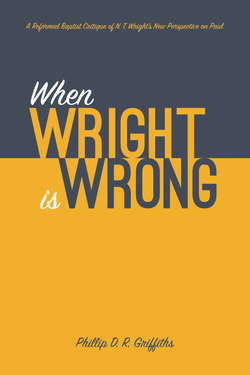Читать книгу When Wright is Wrong - Phillip D. R. Griffiths - Страница 4
На сайте Литреса книга снята с продажи.
Preface
ОглавлениеTom Nicholas Wright can be described as the public face of what has become known as the new perspective on Paul. He is certainly the most popular, and most vocal, of its proponents. Through his many works, he has taken his new message to millions of Christians. He has that rare gift of communicating in a manner that is both informative and entertaining. This, coupled with his academic credentials, has caused many Christians to reassess their understanding of the nature of the atonement, especially justification by faith alone.
In this short work, as well as examining why I believe Wright’s understanding of justification by faith alone is out of kilter with what the Scriptures teach, I examine his position on other related doctrines, for example, the essential difference between the old and new covenants, the nature of Old Testament sacrifices, life after death, the kingdom of God, and the penal verses Christus Victor theories of the atonement.
At the heart of the disagreement between Wright’s position and that of Reformed Baptists is the way we view the covenants. The view argued for here maintains that all believers from both testaments have been saved in virtue of the new covenant in Christ. I show that the old and new covenants are not, as the paedobaptists would have us believe, different administrations of the one covenant of grace, but two separate covenants; each with its own particular blessings and punishments. Appreciating this will be vital for understanding what I believe to be Wright’s inconsistency in the way he views the different covenants, for example, he tells us that Jesus fulfilled the old covenant, and then applies that covenant’s temporal blessings to the new covenant, thereby, confusing the type with the antitype.
Wright’s position can be very difficult to understand and, on occasions, one might think that I am charging him with something he does not actually believe. However, taking the work as a whole, I hope I have shown that there are some fundamental differences between our positions, differences that go to the very heart of what Reformed Baptists believe.
I have on a number of occasions asked myself if I’m guilty of confirmation bias. This occurs when one gravitates toward those views one agrees with and avoids those that may call what one believes into question. Sometimes it occurs unconsciously, where one tends not to see the facts that may challenge one’s understanding. Reading Wright has caused me to stop a number of times to consider whether his position is correct. Whether I am missing something. I have tried hard to see things from his perspective. I realize that no one is without prejudice, that no one can approach a text with complete candour. I have concluded that while I might be charged with confirmation bias, I am, nevertheless, convinced that the view expressed in this book is what Scripture teaches.
Some might wonder why, as a Baptist, I make use of works written by Reformed paedobaptists. I do this because on the majority of issues we are in full agreement. Indeed, much of the Second London Baptist Confession of 1689 mirrors that of the Westminster Confession. Again, some may wonder why I allude to theologians from a bygone age e.g., John Owen, John Gill etc., believing that theology has moved on. I reject this idea. The so-called new paths are not better than those hewn out by our predecessors, and, without doubt, the essentials of the Faith were articulated by men like Owen in a manner that is sadly lacking in much contemporary theology.
I have learned much from reading Wright and agree with a lot of what he has had to say. Some reading this work may well wonder why I have not said more about the positives. The reason I have not done so is simply that I want to concentrate on those parts of his teaching where there is disagreement. To spend time examining those areas in which we agree would involve a much longer book.
I have avoided ad hominem arguments1. These tend to be employed to shore up weak arguments. Let me also say that I would not hesitate to say that Wright is a Christian, but I would argue that he has gone astray in regard to certain doctrines. I would even say that in regard to living the Christian life, the way Wright conducts himself is an example we should all seek to emulate.
As I read over the work, my mind keeps informing me of other things I should have included. However, no work can cover all, and while this work might be imperfect, it is my desire that, while it will not convince all, it will engender greater thought and Bible searching on the issues covered.
Just one more thing. I have edited this work myself. When doing this there is always a tendency to read what one assumes to be written rather than what is actually on the page. I am certain there are times when I have done this. I trust there won’t be too many typos, and I apologize beforehand for any that I may have missed.
1. Arguments that attack the person rather than the arguments.
